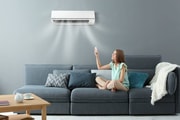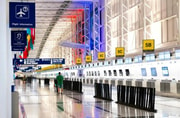Stop overpaying! AC experts reveal the costly mistake adding hundreds to your energy bill
- Replies 0
As the mercury climbs and summer’s sizzle settles in, many at The GrayVine are bracing for the annual spike in our energy bills.
But what if we told you that a simple, well-intentioned habit could be quietly draining hundreds of dollars from your wallet every year? And what if the solution was not only free, but also confirmed by seasoned AC professionals?
Let’s pull back the curtain on one of the most persistent myths about home cooling—and show you how to keep your cool (and your cash) all summer long.
The Surprising AC Mistake Costing You Big
It’s a scenario you’ve all been in: You’re heading out for the day, or maybe the evening air finally cools off, so you flip off the air conditioner to “save money.”
Later, you return to a sweltering house and crank it back on, expecting a lower bill for your efforts. But here’s the kicker—this on-again, off-again approach is actually costing you more.
This revelation recently went viral on social media, where a user shared his shock at learning that cycling your AC on and off is a surefire way to hike up your electricity bill.
The video, which racked up over 4.4 million views, struck a chord with viewers—many of whom thought they were being energy-savvy.

Why Turning Your AC On and Off Is a Wallet Drainer
Let’s break down the science. Air conditioning units are designed for steady, continuous operation. When you turn your AC off, your home heats up.
When you turn it back on, the system has to work overtime to bring the temperature back down, drawing a surge of electricity in the process. This “hard start” is far less efficient than maintaining a consistent, comfortable temperature.
According to HVAC experts and companies like Smart AC Solutions, frequent cycling not only spikes your energy usage, but also puts extra strain on your system’s compressor and motor.
Over time, this can lead to costly repairs or even premature replacement—another hit to your budget.
Also read: Unlocking the secrets of your AC: The "Dry" button’s benefits you never knew!
The Numbers Don’t Lie
The National Energy Assistance Directors Association (NEADA) reports that the average American household will spend $783 on electricity this year—a 6.2% jump from 2023, and the highest in over a decade.
With energy prices on the rise, every dollar counts. And as some social media users discovered firsthand, leaving the AC running at a steady temperature actually resulted in lower monthly bills compared to the stop-and-start method.
Debunking the Skeptics
Of course, not everyone is convinced. Some folks in the comments joked that energy companies must be behind this advice.
But multiple HVAC technicians chimed in to confirm: “As an HVAC tech, this is true.” Others shared their own experiments, noting that their bills were noticeably higher when they cycled their AC on and off.
Source: @mountaindrewsky / Tiktok.
Smart Ways to Keep Cool Without Breaking the Bank
So, what’s the best way to stay comfortable and keep your energy bills in check? Here are some tried-and-true tips from AC pros and home experts:
1. Set It and Forget It: Pick a comfortable temperature (most experts recommend 76-78°F) and leave your thermostat alone. Constant adjustments force your system to work harder.
2. Keep Electronics Away from the Thermostat: TVs, computers, and lamps can trick your thermostat into thinking the room is warmer than it is, causing your AC to run unnecessarily.
3. Shade Your AC Unit: If possible, keep your outdoor unit shaded. This helps it run more efficiently and reduces the workload.
Also read: Could your weekends be energy-free? Here’s how some Americans are getting electricity at no cost
4. Clean or Replace Filters Regularly: A dirty filter restricts airflow, making your system work harder and use more energy. Check filters monthly during heavy use.
5. Don’t Fiddle with the Vents: Leave your vents open and unobstructed for even cooling throughout your home.
6. Check Your Air Ducts: Leaky ducts can waste up to 30% of your cooled air. Have them inspected and sealed if needed.
7. Use Ceiling Fans Wisely: Fans help circulate cool air, allowing you to set your thermostat a few degrees higher without sacrificing comfort.
8. Close Curtains and Blinds: Block out the sun during the hottest part of the day to keep your home cooler naturally.
Bonus Tip: Take Advantage of Utility Programs
Some energy companies offer “free electricity” periods or rebates for using power during off-peak hours. Check with your provider to see if you can save even more.
Read next: How to score 9 hours of free electricity every day—See if your energy company is giving this away

Have you tried leaving your AC on all day? Did you notice a difference in your bill? Or do you have your own energy-saving secrets to share? Drop your thoughts, questions, and stories in the comments below!
But what if we told you that a simple, well-intentioned habit could be quietly draining hundreds of dollars from your wallet every year? And what if the solution was not only free, but also confirmed by seasoned AC professionals?
Let’s pull back the curtain on one of the most persistent myths about home cooling—and show you how to keep your cool (and your cash) all summer long.
The Surprising AC Mistake Costing You Big
It’s a scenario you’ve all been in: You’re heading out for the day, or maybe the evening air finally cools off, so you flip off the air conditioner to “save money.”
Later, you return to a sweltering house and crank it back on, expecting a lower bill for your efforts. But here’s the kicker—this on-again, off-again approach is actually costing you more.
This revelation recently went viral on social media, where a user shared his shock at learning that cycling your AC on and off is a surefire way to hike up your electricity bill.
The video, which racked up over 4.4 million views, struck a chord with viewers—many of whom thought they were being energy-savvy.

Frequently turning your air conditioner on and off can actually increase your energy bill, rather than save you money. Image source: isaac. / Unsplash.
Why Turning Your AC On and Off Is a Wallet Drainer
Let’s break down the science. Air conditioning units are designed for steady, continuous operation. When you turn your AC off, your home heats up.
When you turn it back on, the system has to work overtime to bring the temperature back down, drawing a surge of electricity in the process. This “hard start” is far less efficient than maintaining a consistent, comfortable temperature.
According to HVAC experts and companies like Smart AC Solutions, frequent cycling not only spikes your energy usage, but also puts extra strain on your system’s compressor and motor.
Over time, this can lead to costly repairs or even premature replacement—another hit to your budget.
Also read: Unlocking the secrets of your AC: The "Dry" button’s benefits you never knew!
The Numbers Don’t Lie
The National Energy Assistance Directors Association (NEADA) reports that the average American household will spend $783 on electricity this year—a 6.2% jump from 2023, and the highest in over a decade.
With energy prices on the rise, every dollar counts. And as some social media users discovered firsthand, leaving the AC running at a steady temperature actually resulted in lower monthly bills compared to the stop-and-start method.
Debunking the Skeptics
Of course, not everyone is convinced. Some folks in the comments joked that energy companies must be behind this advice.
But multiple HVAC technicians chimed in to confirm: “As an HVAC tech, this is true.” Others shared their own experiments, noting that their bills were noticeably higher when they cycled their AC on and off.
Source: @mountaindrewsky / Tiktok.
Smart Ways to Keep Cool Without Breaking the Bank
So, what’s the best way to stay comfortable and keep your energy bills in check? Here are some tried-and-true tips from AC pros and home experts:
1. Set It and Forget It: Pick a comfortable temperature (most experts recommend 76-78°F) and leave your thermostat alone. Constant adjustments force your system to work harder.
2. Keep Electronics Away from the Thermostat: TVs, computers, and lamps can trick your thermostat into thinking the room is warmer than it is, causing your AC to run unnecessarily.
3. Shade Your AC Unit: If possible, keep your outdoor unit shaded. This helps it run more efficiently and reduces the workload.
Also read: Could your weekends be energy-free? Here’s how some Americans are getting electricity at no cost
4. Clean or Replace Filters Regularly: A dirty filter restricts airflow, making your system work harder and use more energy. Check filters monthly during heavy use.
5. Don’t Fiddle with the Vents: Leave your vents open and unobstructed for even cooling throughout your home.
6. Check Your Air Ducts: Leaky ducts can waste up to 30% of your cooled air. Have them inspected and sealed if needed.
7. Use Ceiling Fans Wisely: Fans help circulate cool air, allowing you to set your thermostat a few degrees higher without sacrificing comfort.
8. Close Curtains and Blinds: Block out the sun during the hottest part of the day to keep your home cooler naturally.
Bonus Tip: Take Advantage of Utility Programs
Some energy companies offer “free electricity” periods or rebates for using power during off-peak hours. Check with your provider to see if you can save even more.
Read next: How to score 9 hours of free electricity every day—See if your energy company is giving this away
Key Takeaways
- Frequently turning your air conditioner on and off can actually increase your energy bill, rather than save you money.
- HVAC experts confirm that leaving your AC unit running at a steady temperature is more efficient and prolongs the life of your system.
- Constantly switching your AC on and off causes extra wear and tear, leading to higher power usage and potentially costly repairs.
- Simple tips like shading your AC unit, cleaning the filter, and not fiddling with the vents can also help keep your home cooler without pushing up your energy bill.
Have you tried leaving your AC on all day? Did you notice a difference in your bill? Or do you have your own energy-saving secrets to share? Drop your thoughts, questions, and stories in the comments below!






